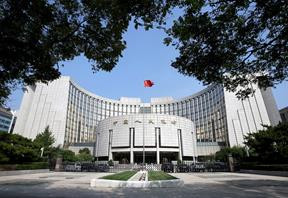China's major lenders are expected to record profit growth of roughly 10% in the third quarter, as high fee income and stable loan growth more than offset any exposure to the troubled real estate market.
While the liquidity squeeze at troubled developers such as China Evergrande, Fantasia Holdings Group, and Sinic Holdings Group will almost certainly begin to show up on banks' loan books, most analysts believe the sector's exposure to banks remains limited, and thus unlikely to have an effect on their non-performing loan ratios.
On Thursday and Friday, leading state-owned lenders Bank of China, China Construction Bank, Agricultural Bank of China, and Bank of Communications will announce third-quarter earnings.
Although China's economic growth slowed to almost 5% in the third quarter from 7.7 percent in the second, loan growth remained robust at 11.4%, data released this month by the banking regulator .
Banks will record significant rise in revenue from wealth management products and mutual fund distribution fees, Cindy Wang, an analyst at DBS, said.
"Retail clients have transferred their money away from real estate and toward financial markets, benefitting banks' fee income as a result of increased sales of wealth management products," Wang explained. "In general, we anticipate that this will benefit the banks' revenue growth," Wang added.
Many Chinese financial institutions are creditors of insolvent developers such as Evergrande and Fantasia, which have fallen behind on bondholder payments. Banks are exposed to the sector by direct lending to developers and through residential mortgage loans secured by the developments they construct.
DBS calculated that the NPL ratio for the property development sector had increased to a 10-year high of 2.17% in June this year, up 139 basis points from the same month in 2020.
Nonetheless, these loans represent less than 8% of total bank loans in China, demonstrating that the overall risk is manageable.
Mortgage loans accounted for around 23% of the loan book of the banking sector. Chinese banks have taken a cautious approach, requiring borrowers to make large down payments, often between 30% and 40% of the property's worth, Chen Shujin, an analyst at Jefferies, said.






